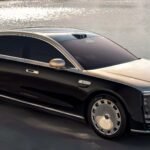Next-Generation Electric Minis Could Switch to Rear-Drive
The next-generation electric Mini cars may see a shift from the traditional front-wheel-drive setup to rear-drive, thanks to the introduction of a new BMW Group platform. This move is part of the brand’s evolution towards more advanced technologies and improved performance.
The upcoming Gen6 800V architecture, developed by Mini’s parent company, promises significant advancements over current-generation EV technology. These include enhancements in range, charging speeds, and cost-effectiveness in manufacturing electric vehicles.
Starting with the next-generation BMW iX3 in September, which will be based on the Vision Neue Klasse SUV concept, the new Gen6 technology will be gradually integrated into all BMW, Rolls-Royce, and Mini electric vehicles as they transition to their next-generation models.
While the current Cooper and Aceman models are front-wheel-drive and utilize a unique architecture developed in collaboration with Great Wall Motor in China, the upcoming Mini electric cars are expected to transition to the Neue Klasse platform. This shift could mark a significant departure from Mini’s traditional front-wheel-drive heritage, as the new platform’s configurability favors rear-wheel-drive configurations.
BMW Group engineers have indicated that the platform will primarily support rear- and all-wheel-drive setups in various motor configurations, emphasizing the benefits of a rear-wheel-drive layout for improved dynamics and driving pleasure. While there are currently no plans for front-wheel-drive electric Minis in the future, the brand remains committed to preserving the essence of “Mininess” in its upcoming models.
Despite the potential changes in drivetrain layout, Mini’s current lineup, including the Cooper, Aceman, and Countryman, has recently undergone a complete refresh. This means that any significant alterations to the platform and drivetrain configurations are still a few years away.







